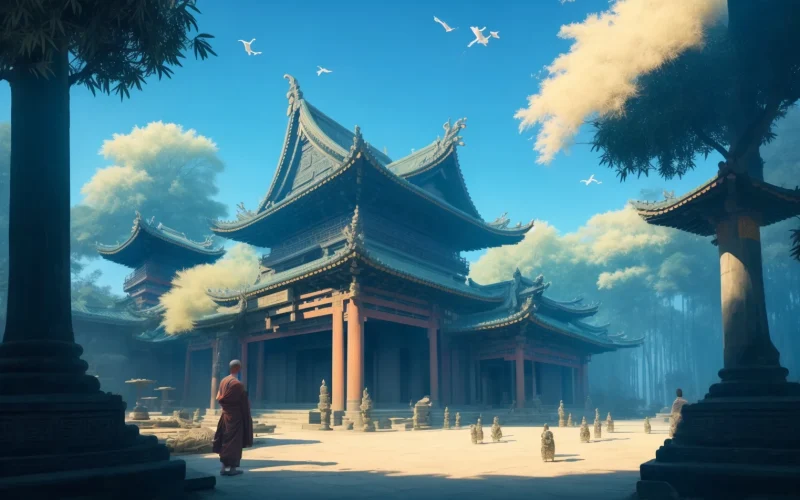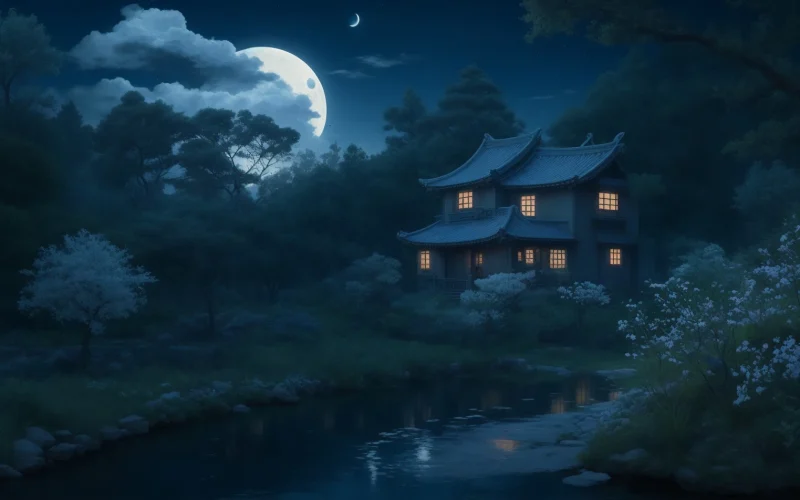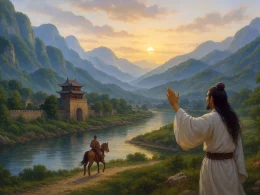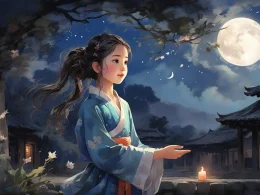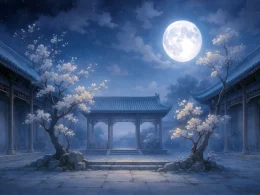In the pure morning, near the old temple, Where early sunlight points the tree-tops, My path has wound, through a sheltered hollow Of boughs and fl.ewers, to a Buddhist retreat. Here birds are alive with mountain-light, And the mind of man touches peace in a pool, And a thousand sounds are quieted By the breathing of a temple-bell.
Original Poem:
「题破山寺后禅院」
常建
清晨入古寺,初日照高林。
曲径通幽处,禅房花木深。
山光悦鸟性,潭影空人心。
万籁此俱寂,但余钟磬音。
Interpretation:
This is a landscape poem written by the author when he traveled to the Bashan Temple (now Xingfu Temple) in Yushan Mountain to express his feelings of seclusion. Through the description of the deep and quiet environment of the ancient temple, the poem expresses the poet's attitude of living a life of indifference, tranquility and love for the landscape. The Broken Mountain Temple is located on Yushan Mountain in Changshu City, Jiangsu Province, which is called Broken Mountain Temple because of the legend that dragons fought with each other and broke the mountain.
The first two sentences: early in the morning into the ancient broken mountain temple, the rising sun reflects the towering mountain forest. The technique of white description outlines the ancient temple bathed in the morning glory, the dense jungle of ancient trees in the shadow, the freshness of the air to the face.
The third and fourth sentences: the winding path leads to a deep place, the Zen room is hidden in the flowers and trees. Depicting the landscape of the back of the Zen garden. The winding path, the Zen room, the secluded, deep, seize the most characteristic scenery, a few figures, rendering the back of the Zen garden of the secluded silence, seems to be flat to say, but full of mystery.
The fifth and sixth sentences: the green hills of bright emerald color so that the birds issued a happy chirping, the deep pool of the changing shadow of the waves so that people's minds are clear and transparent. From the objective description to the subjective feelings, but still with concrete objects to visualize the transmission of the temple's seclusion is not only pleasing to the eye, but also cleanses all the world's troubles, the poet felt infinite joy to be in it.
The last two lines: at this time, in the old broken mountain temple, all the sound has been silent, only hear the sound of the bell and chime. Bells and chimes are commonly used in temples. To eliminate all the worldly noise, only the melodious sound of the bell slowly ringing, accompanied by a clear chime, in the quiet of the ancient temple back and forth, the aftermath of the rhyme curl, penetrate into the depths of our souls, so that people realize the realm of Zen.
The poem's deep and wonderful environment, quiet and peaceful atmosphere makes people have a transcendental yearning. The language is simple and clean, fresh and elegant, and the mood is leisurely and timeless, making it a unique masterpiece of landscape poetry in the Tang Dynasty.
Poem translator:
Kiang Kanghu
About the Poet:
Chang Jian (常建), A.D. 708 - c. A.D. 765, received his Bachelor's Degree in A.D. 727 and served as a county lieutenant before resigning from his post and returning to his hermitage in the Western Hills of Wuchang. His poems are mostly about mountains and monasteries, with twisted emotions, tranquil moods, and light and beautiful language.






